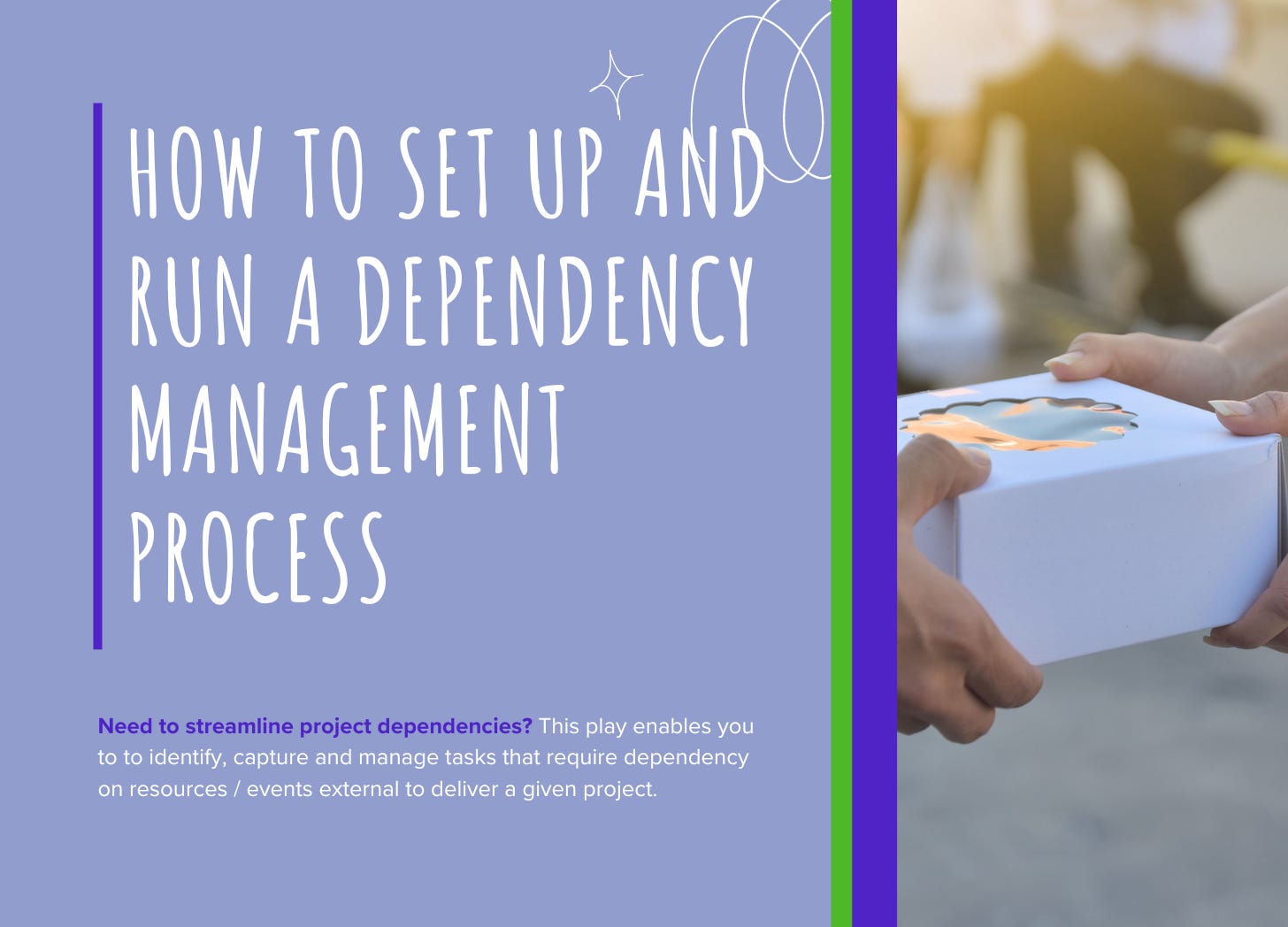How to Set Up and Run a Dependency Management Process
Step-by-Step Guide to Streamlining Your Dependency Management Process
“Dependency Management is the ability to identify, capture and manage tasks that require dependency on resources / events external to deliver a given project.”
Why is Dependency Management so important?
Dependency management is crucial in project management because it ensures that tasks and activities are completed in the correct sequence and within the expected timeframe. Essentially, it's about understanding the relationships between different tasks and identifying which ones are dependent on others. By managing dependencies effectively, projects can:
Maintain efficiency: By identifying dependencies, project managers can schedule tasks in the most efficient order, avoiding unnecessary delays and bottlenecks.
Mitigate risks: Understanding dependencies helps project managers anticipate potential delays or issues that could arise if certain tasks are delayed. This allows them to proactively manage risks and implement contingency plans to keep the project on track.
Improve communication: Dependency management promotes clear communication among team members, stakeholders, and other project participants. When everyone understands the interdependencies between tasks, they can coordinate their efforts more effectively.
Ensure resource allocation: By knowing which tasks depend on others, project managers can allocate resources appropriately to ensure that critical tasks are prioritised and adequately resourced.
Dependency management is essential for ensuring that projects progress smoothly, risks are mitigated, and resources are utilised efficiently.
It's a fundamental aspect of effective project management and one that is most misunderstood.
Why does this matter for PMOs?
Dependency management is particularly relevant for PMOs (Project Management Offices) because they are often responsible for overseeing multiple projects within an organisation. For example:
Portfolio Management: PMOs often manage a portfolio of projects, each with its own set of dependencies. Understanding these dependencies allows PMOs to coordinate projects effectively, ensuring that resources are allocated efficiently and that projects are aligned with organisational objectives.
Risk Management: By identifying dependencies across multiple projects, PMOs can assess the impact of potential delays or issues on the overall portfolio. This enables them to develop risk mitigation strategies and allocate resources accordingly to minimise the impact on project delivery.
When PMOs dismiss dependency management as the ‘Project Manager’s’ job, they lose the necessary oversight to do their jobs effectively.
Resource Allocation: PMOs are responsible for resource management across the portfolio of projects. Dependency management helps PMOs allocate resources effectively by identifying critical paths and prioritising tasks that are dependent on others.
Decision Making: Dependency management provides PMOs with valuable insights into project interdependencies, which inform decision-making processes. PMOs can use this information to prioritise projects, sequence activities, and make informed decisions about project resourcing and scheduling.
How can you plan accordingly without understanding the road ahead?
Stakeholder Management: Clear communication about project dependencies is essential for managing stakeholder expectations. PMOs use dependency management to ensure that stakeholders are informed about potential risks and dependencies that may impact project timelines and deliverables. And/or communicating this to other teams such as Change Management.
Overall, dependency management is crucial for PMOs to effectively oversee and manage the portfolio of projects within an organisation. It enables PMOs to optimise resource allocation, mitigate risks, make informed decisions, and ensure alignment with organisational goals. You see, unlike a Project Manager who may be overseeing one project, they often will not have the visibility of the whole portfolio. A good pmo can also call out dependencies which in turn will increase the chances of success in an organisation overall.
Think of dependency management as a team sport, you need more than one person to play!
The aim of this play is to empower companies to efficiently manage dependencies within their projects and ensure PMO visibility and reporting. It focuses on the process to identify, capture, agree, monitor, and close a dependency. PMO’s can use this process to introduce or uplift existing processes.
Remember dependencies are the key activities which the project is dependent on. These key activities are likely to be from other projects or programs, vendors, internal departments, and sometimes senior management.
Moreover, it aids in aligning projects with resource management and budget considerations, offering clarity on timelines, task assignments, and resource allocation. Whether starting anew or enhancing an existing process, this play serves as a valuable resource for dependency management.
I’ve used this exact process time and time again in some of the world’s biggest companies with great results.
Keep reading with a 7-day free trial
Subscribe to The PMO Playbook to keep reading this post and get 7 days of free access to the full post archives.






